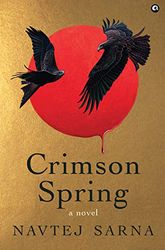Navtej Sarna’s Crimson Spring is set against the backdrop of the Jallianwala Bagh massacre, one of the worst in the history of colonial rule. But at its heart is humanity.
Told through nine characters, Crimson Spring is cinematic in its detail of the days before Brig Gen Reginald Dyer and his team turned their guns on the crowd and fired 1,650 rounds and the bloody aftermath that followed. There is Gurnam, the pleader, who on his white horse kept the crowd away from the railway track that divided the city into British cantonment and Indian town. Then there is Ralla Singh, who was baptised and chose the path of spirituality; Mehtab Singh, his brother-in-law; Lance Naik Kirpal Singh, who fought in Flanders fields; Maya Dei, the lone woman taking on the mantle of representing her gender on her frail shoulders; Sucha, a secret revolutionary who works as a compounder; Hugh J. Porter, who is inspired by J.P. Thompson, then chief secretary of Punjab, and Sergeant Nicholas Williams, who is based on William J. Anderson, Dyer’s personal bodyguard. And, there is Udham Singh, who years later killed Michael O’Dwyer, the civilian administrator who had called in the army to control the crowd.
Sarna uses a slim book to bring the sweep of history. It brings alive the time of 20th century Punjab, and the ferment—the Rowlatt Act, the plague, the soldiers returning home, the gurdwara reforms—and tells the story of a changing political landscape through the inner lives of his characters. He packs in fact with fiction to create a luminous novel.
It is a story that Sarna has lived with clearly. It has the weight of the collective memory of pain. It is also personal, where stories he heard of his family, like his grandfather resigning from government after the massacre, creep into his characters. Maya Dei’s earlier life is inspired from his father Mohinder Singh Sarna’s first Punjabi novel, Peerhan Malle Rah.
The retelling of the Jallianwala Bagh massacre in history has always been told by the side of the empire or the colonised. Crimson Spring is about those who lost and lived. It is delicate yet intense.
Maya Dei is based on Rattan Devi, the only woman who spent the night at the bagh, using a stick to beat the dogs that gathered. Her account of the night leaves a reader shaken. In Sarna’s world, she has a backstory—a husband who is a professor and her longing for a child.
Sarna creates a world conjuring up Tibba, a fictional village with its akhara (wrestling pit) and thekha (liquor shop) that exist side by side. The language is lyrical, like the language of Punjab. So there is Jind who tells her brother Ralla that you don’t tell stories during the day or travellers lose their way. Then there is the unborn moon, all offering a flavour of a language that was once known for its sweetness, its poetry of Bulleh Shah, not of Honey Singh.
Sarna uses Udham Singh’s sacrifice to give the bloody side of independent fighters—a space in the largely peaceful struggle. From Punjab as from Bengal, the memory of their sheer determination has been lost, blunted by peace. These were men of purpose, but also of conscience.
Sarna writes with gentleness, he writes to remember, he writes for his readers to never forget the Punjab of his ancestors. And with Crimson Spring, he successfully ensures that the memory lives on. Not just as fact, but as grief.
Crimson Spring
Author Navtej Sarna
Publisher Aleph Book Company
Price Rs899 Pages 295


